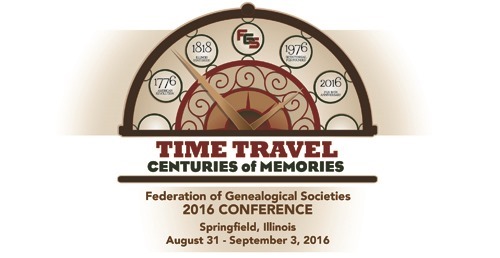 The 2015 Federation of Genealogical Societies Conference has just ended, but planning is well underway for the 2016 conference, which will be held August 31 to September 3, 2016 in Springfield, Illinois. The press release below is the call for presentations, which are due by April 10, 2015.
The 2015 Federation of Genealogical Societies Conference has just ended, but planning is well underway for the 2016 conference, which will be held August 31 to September 3, 2016 in Springfield, Illinois. The press release below is the call for presentations, which are due by April 10, 2015.
2016 FGS National conference Call for presentation Proposals
Deadline for Submissions is 10 April 2015
February 13, 2015 – Austin, TX. The Federation of Genealogical Societies (FGS) announces a Call for Presentation Proposals for the FGS 2016 Conference, “Time Travel: Centuries of Memories,” to be held in Springfield, Illinois, Aug 31 – Sept 3, 2016. The Abraham Lincoln Presidential Library and Museum are within walking distance of the Prairie Capital Convention Center, the conference venue. The conference will be held in cooperation with the Illinois State Genealogical Society as local host. The deadline for submission of presentation proposals is Friday, 10 April 2015.
“Time Travel: Centuries of Memories,” recognizes the vast array of people and resources whose paths into the United States brought them to, and through, the Midwest. Topics related to methodology and research skills are always welcomed, in addition to content-specific areas, such as:
- Military: War of 1812, American Civil War, Indian Wars, World War I, World War II, European and Napoleonic Wars.
- Migration: Europe to North America; naturalization records; passenger lists; ports of entry; to and through the Midwest; the Great Migration (northward from the sharecropping South); migration trails and routes (Mormon, Oregon, Santa Fe); refugee resettlement; modern economic migrants.
- Ethnic Origins: The Baltic Basin (including Poland, Scandinavia, Latvia, Lithuania, Russia, Denmark, Germany); Central Europe (including Germany, Switzerland, Austria, Czech Republic/Bohemia, Hungary); Romance Europe (including France, Spain, Portugal, Italy and the Papal States); the Mediterranean/Adriatic Basin (including Turkey, Greece, Serbia, Croatia, Cypress, Armenia); Latin American research.
- Great Britain and the former British Empire (England, Scotland, Wales, Ireland, Canada, Australia, New Zealand, South Africa, India); the British diaspora; records (civil and ecclesiastical); churches (Anglican, Quaker, Catholic, dissenter, non-conformist, Presbyterians); military records; city directories; trade directories; guilds; poll books; valuations and tax records.
- Occupations & Work: Farmers, carpenters, brewers/distillers, boatmen, firefighters/police, railroaders, canal builders, laborers and factory hands; women in the workforce; unions, guilds and apprenticeships; coal miners; slaughterhouse workers; doctors, midwives and pharmacists; clerks and lawyers; pressmen and printers; trade directories; smugglers, bootleggers and other illicit trades.
- Religions, Adherents and Records: Jewish, Orthodox, Catholic and Protestant traditions and records; religious colonization’s and refugee movements; Pogrom and Holocaust survivors and research; the Underground Railroad; Mormon/LDS; utopian communities; peace churches, pacifists and conscientious objectors; convents, monasteries and cloistered communities.
- Regional research: Research repositories in the Midwest; research in Illinois and nearby states—Kentucky, Missouri, Iowa, Wisconsin, Indiana, Michigan and Ohio; archival collections; college and university research collections; migration destinations from Illinois: the Great Plains, Texas, Oklahoma, and California; migration to Illinois from feeder states of the east and south.
- Genetics & DNA: the basics of DNA research; autosomal studies and advanced analysis; testing procedures; ethical considerations; adoptions; forensic and expert work; case studies.
- Skills, Abilities & General Knowledge: Beginning research techniques; evidence analysis; online resources and tools; wikis; collaboration techniques and etiquette; terminology; comparative analysis; units of measure, trade and currency; time, calendars and dates; writing a family history; publishing – print vs. eBook; creating websites, blogs and vlogs; earning genealogical credentials.
The program committee specifically seeks new and dynamic proposals that will provide exceptional learning experiences for conference attendees. Proposals for workshops and sponsored talks are encouraged.
Multiple proposals (more than four) are welcome and encouraged, as most chosen to speak will be engaged for more than one presentation. There is no limit on the number of proposals a speaker may submit.
Submission Requirements
Speaker submissions and deadlines for the FGS 2016 Conference reflect the implementation of an online submission system. Interested parties must submit all presentation proposals using the online portal, which will open 20 February 2015. The Call for Presentations is now open and will close on Friday, 10 April 2015.
This deadline is for all proposal submissions including sponsored presentations.
Compensation
Selected speakers receive an honorarium, travel compensation, and conference registration as well as per diem and hotel nights based on the number of presentations given. (Sponsored speakers only receive conference registration and syllabus materials. See more about sponsorships below.) Non-sponsored speakers receive compensation according to the FGS Conference Speaker Policy at www.fgs.org/conferences/speakerpolicy.php.
Sponsored Presentations
Societies and businesses are encouraged to submit proposals for sponsored talks by the stated deadline for proposal submission. The sponsoring organization will cover its speaker’s costs to present the presentation. Sponsored speakers are expected to abide by all speaker deadlines and syllabus requirements. Sponsored speakers will receive complimentary FGS conference registration and electronic syllabus materials.
Additional Information
Invitations will be issued in October 2015. Syllabus format guidelines will be sent to speakers at that time. The deadline for acceptance and submission of signed speaker contracts is 1 November 2015.
Camera-ready handouts are required for each presentation or workshop presentation and will be compiled in a syllabus distributed to conference participants. The deadline for submissions of syllabus materials is Wednesday, 13 April 2016.
About the Federation of Genealogical Societies (FGS)
The Federation of Genealogical Societies (FGS) was founded in 1976 and represents the members of hundreds of genealogical societies. FGS links the genealogical community by helping genealogical societies strengthen and grow through resources available online, FGS Forum magazine (filled with articles pertaining to society management and genealogical news), and Society Strategy Series papers, covering topics about effectively operating a genealogical society. FGS also links the genealogical community through its annual conference — four days of excellent lectures, including one full day devoted to society management topics. To learn more visit http://www.fgs.org.
Follow us on Facebook (https://www.facebook.com/FGSgenealogy), Twitter (http://www.facebook.com/FGSgenealogy) and on our blog at (http://voice.fgs.org).

Share your thoughts...